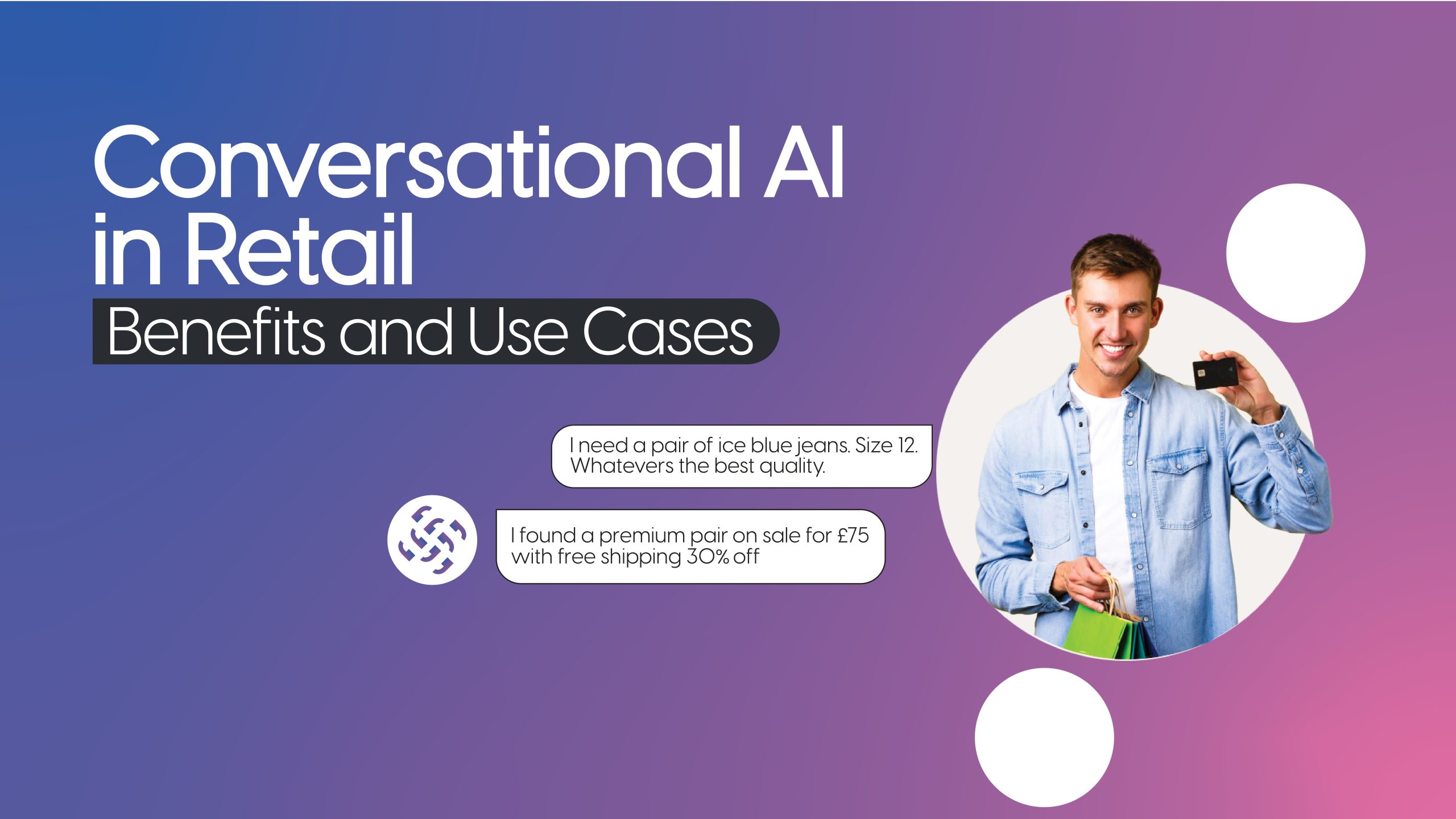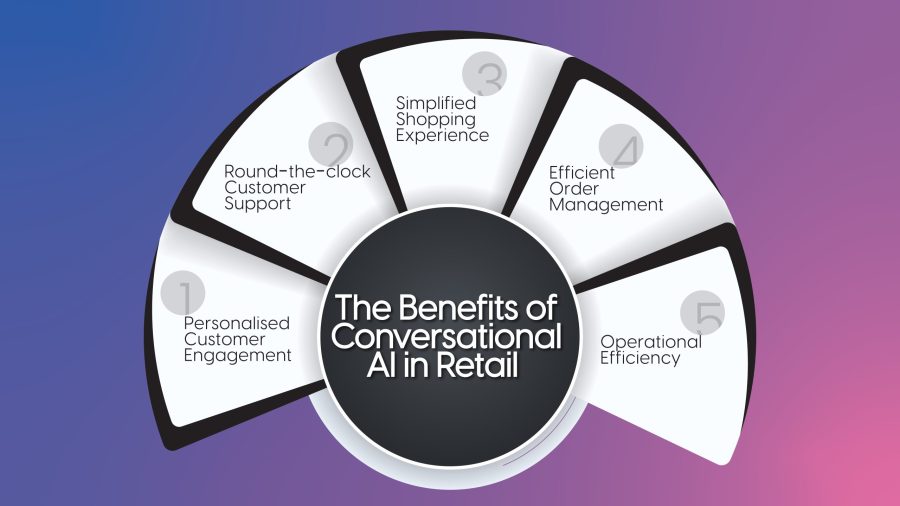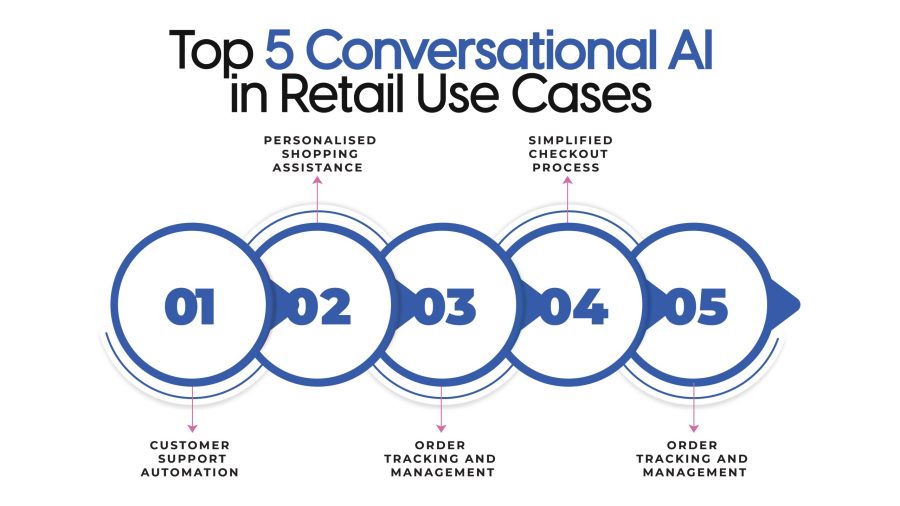
Conversational AI in Retail: Benefits and Use Cases
Modern retail is all about smarter, faster, and more personal service. Today’s customers want instant answers, personalised recommendations, and a hassle-free shopping experience. Artificial Intelligence (AI) is stepping in to meet those needs—particularly conversational AI, which serves as a smart shopping assistant to customers. It helps retailers connect with shoppers in smarter, faster ways.
From reducing wait times to driving sales, conversational AI has numerous applications that makes it a highly popular choice for retailers. But what is it exactly? How does it work? And what are its benefits and use cases in retail? Let’s find out!
Table of Contents
New CommBox survey reveals that 43% of UK consumers are dissatisfied by long wait times, mainly due to no access to human agents and chatbots that can’t resolve issues

What is conversational AI in retail?
Conversational AI is like a smart, digital helper that can chat with customers, answer questions, and even assist with tasks. It goes beyond rule-based chatbots by using technology like natural language processing (NLP) and machine learning to understand what they say and respond in a way that feels natural, just like talking to a human.
In retail, conversational AI works as an online shopping companion. It can answer product questions, recommend items based on your preferences, and guide customers through their purchase—all without them having to wait for a human.
The benefits of conversational AI in retail
According to a Salesforce Connected Shoppers Report, consumers use the chat channel for 20% of their goods purchase (31% for purchasing services). This number is increasing as consumers find it easier and faster to get responses over the chat channel.
According to a 2024 Statista survey, 82% of consumers preferred using the chat channel for quick communication with brands over waiting for a customer representative. Here are some key benefits of Conversational AI for retail:
Personalised customer engagement
Conversational AI tools analyse customer preferences to offer personalised product suggestions. This personal touch enhances the shopping experience, making customers feel understood and valued.
Round-the-clock customer support
AI-powered smart shopping assistants are always available, providing 24/7 support to customers. This means shoppers can get answers to their questions at any time, improving convenience and trust. Many advanced conversational AI platforms also support voice search. The AI voice assistant allow customers to shop with ease.
Simplified shopping experience
Conversational AI simplifies shopping by guiding customers through product discovery and purchase processes. This assistance reduces friction, making it easier for customers to find and buy what they need. As per the SAP Emarsys 2024 survey, 35% of UK consumers have discovered new products through AI, an increase from 26% the previous year.
Efficient order management
AI-powered smart shopping companions help customers track orders, answer policy questions, and handle post-purchase inquiries. This streamlines order management, reducing the workload on human staff and speeding up response times.
Operational efficiency
Conversational AI frees up human employees to handle more complex issues. It automates routine tasks like answering common questions and processing simple orders, supporting better resource allocation and operational workflows.

Top 5 conversational AI in retail use cases
According to Shopify 2024 statistics report, over 80% of retail executives anticipate that their companies will implement AI automation by 2025. Interestingly, conversational AI is one of the most popular applications of AI in retail. Here are some common use cases of conversational AI in retail:
- Customer support automation: Conversational AI can handle common customer queries instantly, like product details, store hours, or return policies, without involving human agents. These customer service AI use cases save time for both customers and retailers, allowing human agents to focus on more complex issues.
- Personalised shopping assistance: AI-powered smart shopping companions can act like personal shopping assistants, recommending products based on a customer’s browsing history or preferences. AI answering questions based on personalised data and specific requirements creates a personalised shopping experience, helping customers find what they need faster.
- Order tracking and management: Once a customer has made a purchase, Conversational AI can keep them updated with real-time order tracking and delivery information. Instead of waiting on hold or sending an email, customers can simply ask the AI about their order status, making the process smoother and faster.
- Easier checkout process: An AI-powered smart shopping assistant can assist customers through the checkout process by answering any last-minute questions or issues they might face. It serves as an AI concierge for online shoppers. Whether it’s about payment options, shipping methods, or applying a promo code, it’s there to guide them through the final steps.
- Feedback and reviews collection: After a purchase, conversational AI can automatically request feedback or reviews from customers, making it easier to gather valuable insights. A personalised virtual assistant for customer service encourages more people to share their opinions.
Conversational AI in retail: best practices
Conversational AI has delivered promising results for retailers, simplifying how they interact with customers. When integrated correctly, it can enhance efficiency, improve customer satisfaction, and boost sales. Here are some best practices to maximise its potential and get the best possible outcomes.
Keep it simple and clear
While conversational AI can handle complex tasks, it’s important to keep the interactions straightforward and user-friendly. Avoid overwhelming customers with too many options or complicated language. The AI should guide customers step-by-step, ensuring they never feel lost. Clear, simple conversations lead to faster resolutions, making customers more likely to use the service again.
Personalise interactions
Conversational AI should offer personalised experiences based on each customer’s browsing history, preferences, and previous interactions. This makes customers feel valued and increases their likelihood of making a purchase.
Ensure easy handover to human agents
While AI can handle most basic tasks, sometimes a customer may need a human touch. It’s essential to have a smooth transition from AI to a live agent when necessary. This can happen when the AI identifies that it can’t resolve an issue or when a customer requests more detailed support.
The future of conversational AI in retail
The future of conversational AI looks great! According to MarketsandMarkets press release, the conversational AI market is expected to grow from USD 13.2 billion in 2024 to USD 49.9 billion by 2030, at a CAGR of 24.9%.
But let’s talk about 2025. The future is here, and it’s moving fast. Retailers are increasingly using AI to optimise their operations, mainly for customer service and hyper-personalisation. In just a few years, it wouldn’t be surprising if retailers depend entirely on conversational AI to support their customers. The technology today is already capable of handling most customer queries, even the complex ones.
The businesses that adopt this technology now will have the advantage. They’ll get ahead of the curve, learn from the technology, and optimise their processes over time to achieve the best possible results. It’s about getting in early and adapting, so you’re not just keeping up, but leading the way.
A final word
AI in retail isn’t something new. Many businesses have been using AI for customer experience for a while now. According to Statista, 83% of e-commerce businesses in the UK are already using AI, and 77% are deploying AI agents in customer service. In fact, AI is considered the top technology by UK retail leaders to unlock and accelerate growth in 2025.
If you haven’t started yet, it’s never too late to get on board and make AI work for your retail business. Try Converso.ai today!
Meet your smart shopping companion: Converso.ai
At Converso.ai, we asked ourselves: Why don’t chatbots truly work? Then, we reimagined the entire experience. The result? An AI solution that doesn’t just answer questions—it understands and adapts.
Take your retail business to next level
Conversational AI in retail: FAQs
Can Conversational AI handle multiple customer interactions at once?
Yes, Conversational AI can manage multiple customer interactions simultaneously. Unlike human agents, it can chat with countless customers at once, ensuring no one has to wait for assistance. This capability leads to improved efficiency, especially during high-demand periods like Boxing Day or Black Friday.
How secure is Conversational AI for handling customer data?
Conversational AI solutions are designed with robust security measures to protect customer data. They comply with industry standards and regulations like GDPR to ensure sensitive information is encrypted and kept secure.
What are the differences between rule-based chatbots and Conversational AI?
Rule-Based chatbots follow fixed scripts, responding only to specific commands or keywords, which can provide limited support. Conversational AI agents use natural language processing and machine learning to understand context, learn from interactions, and handle a wider range of queries, offering dynamic and personalised experiences.
How does Conversational AI handle multiple languages and regional dialects?
Advanced conversational AI systems are designed to recognise and understand various languages and regional accents. They can automatically detect the language a customer is using and respond in kind, ensuring clear and effective communication. This capability is particularly beneficial in the regions like UK, where diverse languages are spoken.
Are retailers in the UK already using conversational AI?
Yes. Many leading UK retailers are already integrating conversational AI to enhance customer experiences and streamline operations. Brands like M&S, Tesco, John Lewis, and ASOS are leveraging AI-powered chatbots to assist customers with product recommendations, order inquiries, and support. Retailers such as Boots, Lush, and Argos are also utilising this technology to improve customer service, making shopping easier and more personalised.
